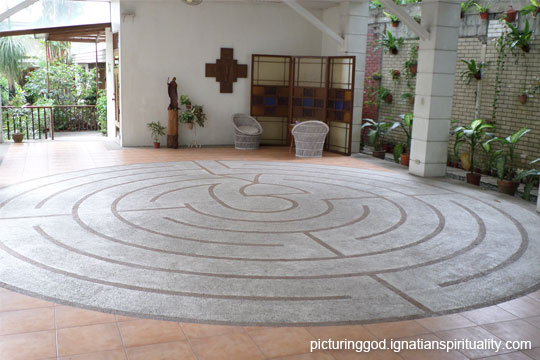
On my way to work each day, as I ride the train from the south side to the north side of Chicago, I see a variety of storefronts advertising spiritual wellness—places to nurture one’s body, mind, and spirit in order to achieve serenity and calmness as well as answers to life’s questions. They offer Reiki, meditative breathing, yoga, guided meditation, acupuncture, Chakra balancing, sweat lodge ceremonies, healing circles, tarot cards, and spiritual classes. While they emphasize that they are non-denominational, it is no secret that, for the most part, they are drawing from Eastern religions.
For most people, Catholicism is not seen as a spiritual path. And that’s unfortunate in a world where more and more people are calling themselves “spiritual but not religious.” What do we mean by a “spiritual path”? Simply put: getting in touch with the meaning and direction of one’s life. It means nurturing a relationship with one’s creator. It means “finding yourself” instead of being lost. These are all things that Catholicism offers. And yet, the Church doesn’t “package” itself that way. As a result, the Church tends to be perceived, not as a spiritual path, but as an institution.
What would it look like if a Catholic parish rented a storefront and advertised spiritual wellness? What could the Church offer? What might the “menu” of offerings look like? Here’s a sample:
- Daily Examen—a quick (15-20 minutes), easy, contemplative daily practice to recognize God more clearly in your life.
- Guided Meditation—20, 30, or 40-minute sessions of guided reflection to get in touch with God’s will for your life.
- Centering Prayer—silent prayer designed to experience God’s presence and overcome distractions.
- The Spiritual Exercises—a compilation of meditations, prayers, and contemplative practices developed by St. Ignatius Loyola to deepen one’s relationship with God.
- Taizé Prayer—a prayer form using chant-like music, accompanied by Scripture and silent meditation.
- Adoration of the Blessed Sacrament—an experience of silence in the presence of the Lord.
- Lectio Divina—sacred reading and meditation on brief Scripture passages.
- Spiritual Direction—an opportunity to meet regularly with another person to discover and talk about God’s presence and action in everyday life.
- Rosary—a meditation using prayer beads and the repetition of sacred verses inspired by Scripture to dwell on the mysteries of God’s revealed presence in Jesus.
- Liturgy of the Hours—a method of prayer to make sacred the various times of the day: morning, afternoon, evening, and night.
- Way of the Cross—a meditative walk through Jesus’ journey to the Cross.
- Spiritual Discernment—a process for recognizing God’s will for your life at moments of transition and crisis.
That’s only the tip of the iceberg, but you get the idea. You might say that it sounds like the kind of offerings one might find at a Catholic retreat house. Precisely! But when did we decide as a Church to relegate such offerings to retreat houses? Every Catholic parish should be seen as a spiritual wellness center with a constant invitation for people to engage in opportunities to deepen their spirituality. According to research done by the Gallup Organization, one of the most important factors in determining a church’s health is the extent to which members feel that their spiritual needs are being met. (Growing an Engaged Church, Albert L. Winseman, Gallup Press)
If we are going to be serious about adult faith formation, it is imperative that our parishes become spiritual wellness centers. What will this require? Does it require that every parish hire a professional retreat master and spiritual director? While that would be nice, parish budgets are already stretched. Instead, I suggest that parishes recruit and train parishioners one at a time to facilitate various spiritual enrichment opportunities. At Loyola Press, where I work, I’m amazed at my young co-workers who also work part-time as yoga instructors, spin-class leaders, and aerobics instructors. Their contemporaries are placing trust in them that they will lead them through activities that will bring about physical and emotional wellness. We should be recruiting these same young people and forming/training them to lead activities that foster spiritual wellness.
Obviously, some roles, such as spiritual director, require formal training. What’s stopping us from sending parishioners to get training in spiritual direction in the same way that we send parishioners for lay ministry formation or the diaconate? To be a spiritual director (or perhaps, less intimidating, a spiritual companion), an advanced degree is not required. What is needed is formation in spirituality and a supervised internship. Information about such training and formation programs to become a spiritual director can be found on the website for Spiritual Directors International.
If making our parishes spiritual wellness centers is a goal, what other ideas do you have for making that goal a reality? What does your parish already do to meet the spiritual wellness needs of its members or visitors?
Image courtesy of Picturing God: Faces and Traces of the Divine.



Hi! My husband (pastor) and I (Naturopathic doctor) are passionate about integrating spiritual and physical wellness and have a vision to start some kind of wellness center in the future. This space would would offer the practices you mentioned in your article as well as provide holistic health services such as malnutrition counseling, massage therapy, etc. Just curious… have you seen this implemented succesfully? We would love to learn from others who are doing just what you have described. Thanks!
Hi Maly, I’ve not seen much attempt at this in Catholic circles. Some Catholic retreat centers are more comfortable with holistic offerings so I would do some research of retreat centers for starters.